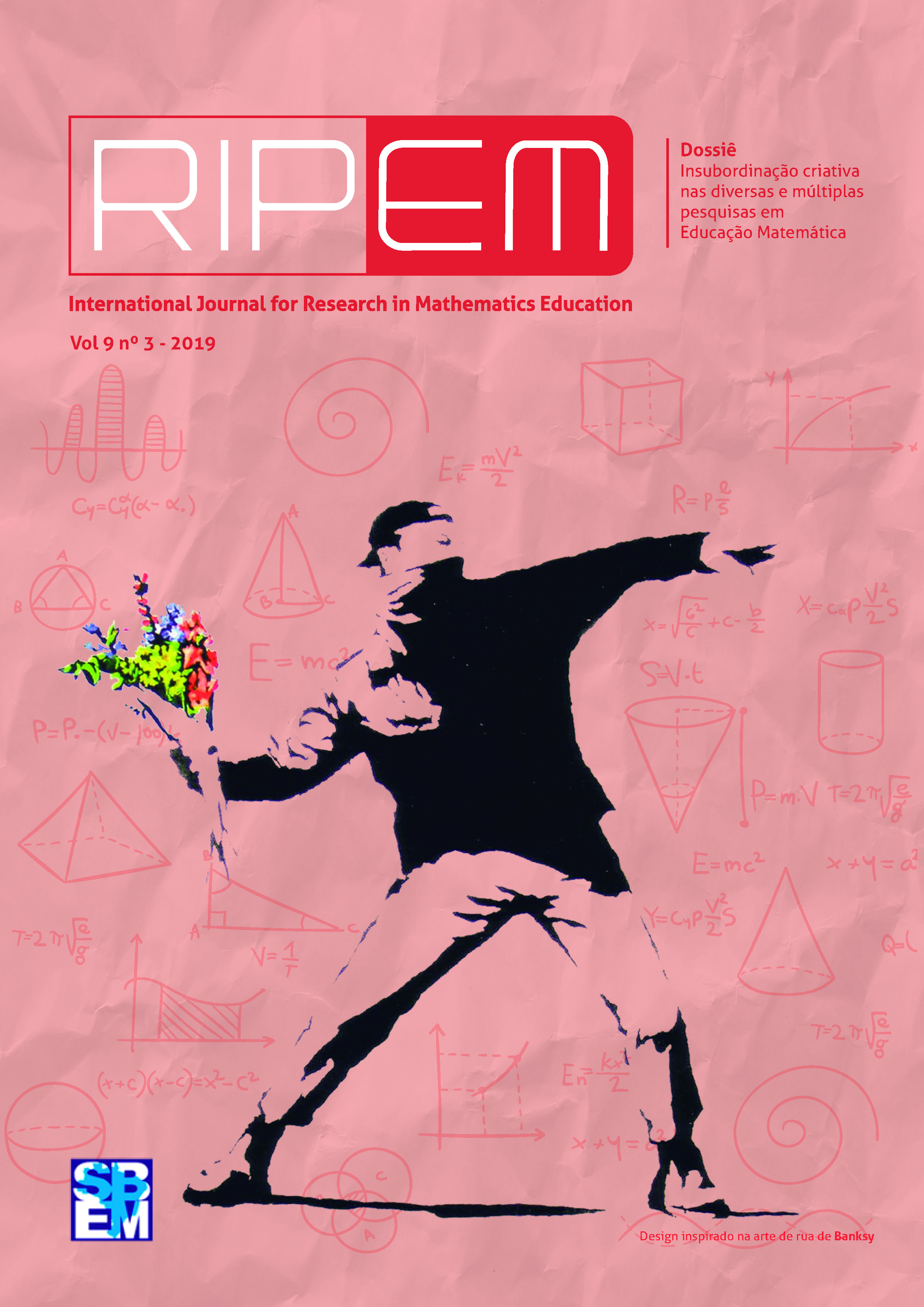Insubordinate practices in Mathematics evaluation
DOI:
https://doi.org/10.37001/ripem.v9i3.2202Palavras-chave:
Evaluation in Mathematics, Creative Insubordination, Alternative EvaluationsResumo
This article reports a Conversation Session presented at ICOCIME 2, discussing actions undertaken by three PhD students of the Post-Graduate Program in Mathematics Teaching (PEMAT), of the Federal University of Rio de Janeiro. Innovative evaluation proposals differ from traditional models, both in terms of the assessment of students’ performance, and in relation to the attitudes of the teachers responsible for the assignment of the grades. Commonly associated with tests, school assessments in mathematics are instruments with generally well-defined characteristics: individual, written, and time bounded. They are usually composed by single response questions and offer generic treatment to all students with the intention of being neutral. Usually applied at the end of a learning cycle, the tests are conceived in a positivist philosophy that attributes to this instrument a character of impartiality and justice. Insubordinate and creative proposals indicate the need to know the students involved in the process, in order to establish a meaningful teaching and learning relationship. In a critical and progressive perspective of the evaluation, it is necessary to consider democracy in the evaluating instrument to build bridges between teachers and students, avoiding the deviations of subjectivity and biases in the correction of the tests.
Downloads
Referências
Barlow, M. (2006). Avaliação escolar: mitos e realidades. Porto Alegre: Artmed.
Benedito, J. E. G. & Buriasco, R. L.C. (2019). Avaliação didática: compartilhando propósitos com as práticas de insubordinação criativa. Anais do XV Encontro Paranaense de Educação Matemática – EPREM. Londrina, PR.
Cochran-Smith, M. & Lytle, S. L. (1999a). The teacher research movement: A decade later. Educational Researcher, 28 (7), 15-25.
Cochran-Smith, M. & Lytle, S. L. (1999b). Relationships of knowledge and practice: teacher learning in communities. Review of Research in Education, 24. New York: Teachers College Press.
D'Ambrosio, B. S. (2015) A subversão responsável na constituição do educador matemático. In: G. Obando (ed). 16º Encuentro Colombiano de Matemática Educativa. Bogotá. CO: Asociación Colombiana de Matemática Educativa.
D'Ambrosio, B. S. & Lopes, C. E. (2015). Insubordinação Criativa: um convite à reinvenção do educador matemático. Bolema, 29 (51) 01-17.
Demo, P. (2003). Avaliação e Democracia. Retrieved from: https://docs.google.com/document/u/1/pub?id=1CWK_791tZwx0VkG59SzfziucNT3CawGE-gWu0bGW5Eg.
Forster, C. (2016). A utilização da prova-escrita-com-cola como recurso à aprendizagem. Dissertação de Mestrado do Programa de Pós-graduação em Ensino de Ciências e Educação Matemática. UEL, Londrina, 122f.
Giraldo, V.; Menezes, F.; Matos, D.; Melo, L.; Mano, V.; Quintaneiro, W.; Rangel, L.; Dias, U.; Neto, C.; Moustapha, B.; Araújo, J. & Cavalcanti, A. (2017). Sharedteachingpractices:integratingexperientialknowledgeintopre-servicemathematicsteachereducation.International Journal for Research in Mathematics Education, 7(2) 4-23.
Lopes, C. A. E.; D'Ambrosio, B. S. & Corrêa, S. A. (2016). Atos de insubordinação criativa promovem a ética e a solidariedade na educação matemática. Zetetike, 24(3), 287-300.
Lopes, C. A. E.; & Carneiro, R. F. (2019) Brazilian contributions for discussions on social justice in mathematics education. International Journal for Research in Mathematics Education, 9(1), 2-7.
Lima, D. O. (2019). Avaliação em Fases em uma Perspectiva Personalizada. XIII ENEM: Educação Matemática com as Escolas da Educação Básica. Cuiabá, MT.
Luckesi, C. C. (1999). Avaliação da aprendizagem escolar. São Paulo: Cortez.
Méndez, J. A. (2002). Avaliar para conhecer: examinar para excluir. Porto Alegre: Artmed.
Menezes, F. & Akio, L. (2019). Prazer da Matemática no ensino hÃbrido: mágicas, jogos, brincadeiras e desafios. XIII ENEM: Educação Matemática com as Escolas da Educação Básica: interfaces entre pesquisas e salas de aula. Cuiabá, MT.
Ortigão, M. I. R. & Frangella, R. C. P. (2015). Assumindo o risco da Decisão–CurrÃculo e Avaliação sob o Signo da Insubordinação. In: D’Ambrosio, B. S. (Ed), Vertentes da Subversão na Produção CientÃfica em Educação Matemática (p. 235-256). Campinas, SP: Mercado de Letras.
Ortigão, M. I. R. & Oliveira, R. L. (2017). Diferença e insubordinação criativa: negociando sentidos com a avaliação. Revista de Ensino de Ciências e Matemática, 8(4), 91-105.
Pires, M. N. M. & Buriasco, R. L.C. (2017). Professores dos anos iniciais, a prova em fases e a possibilidade de aprender. Zetetike, 25(3)474-495.
Perrenoud, P. (1999). Avaliação: da excelência à regulação das aprendizagens - entre duas lógicas. Porto Alegre: Artes Médicas Sul.
Raphael, H. S. (1998). Avaliação escolar: em busca de sua compreensão. São Paulo: Brasiliense.
Soares, J.G. R. & Jannuzzi, P. M. (2005). IDH, Indicadores sinteÌticos e suas aplicações em poliÌticas puÌblicas. Uma anaÌlise criÌtica. Revista Brasileira de Estudos Urbanos e Regionais 7(1) 73-90.
Skovsmose, O. (2000). Cenários para investigação. Bolema-Boletim de Educação Matemática, 13(14), 66-91.
Skovsmose, O. & Alrø, H. (2010). Diálogo e aprendizagem em educação matemática. (2.ed) Belo Horizonte: Autêntica Editora.
Vaz, R. F. N. & Kistemann Jr., M. A. (2019). Uma avaliação feita por licenciandos sobre atividades investigativa-exploratórias de matemática financeira. ReBECEM,.3(2), 316-332.
Vaz, R. F. N. & Nasser, L. (2019). Um estudo sobre multicorreção com licenciandos em matemática. In: GONÇALVES, F. A. M. F (Ed), Educação Matemática e suas Tecnologias, 3 (pp 179-188). Ponta Grossa: Editora Atena.
Wenger, E. (1998). Communities of Practice: Learning, Meaning, and Identity. Cambridge University Press.
Publicado
Como Citar
Edição
Seção

Este trabalho está licensiado sob uma licença Creative Commons Attribution-NonCommercial-NoDerivatives 4.0 International License.








